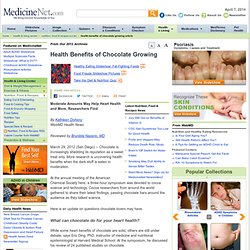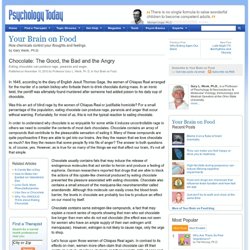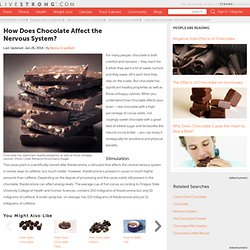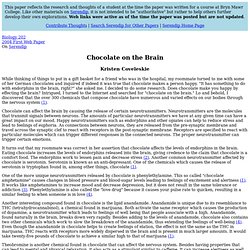

Chocolate is good for you. Chemicals in Chocolate and their Impact on the Brain. Eating chocolate makes us feel good.

But why exactly? Is it the taste? Is there something inside the chocolate? Researchers are trying to answer all these questions. This is what they do know: chocolate contains more than 500 natural chemical compounds, some of which have been categorized as mood-elevating and pleasure-inducing. Following is a list of the compounds believed to have some effects on the brain.
Theobromine Chocolate is one of nature's most concentrated sources of theobromine, a mild, natural stimulant and molecular "cousin" of caffeine. Theobromine has also been shown to reduce coughing and has been used in "natural" cough medicine preparations as a cough suppressant. Health Benefits of Chocolate Growing. Latest Nutrition, Food & Recipes News Moderate Amounts May Help Heart Health and More, Researchers Find By Kathleen DohenyWebMD Health News Reviewed by Brunilda Nazario, MD March 29, 2012 (San Diego) -- Chocolate is increasingly shedding its reputation as a sweet treat only.

More research is uncovering health benefits when the dark stuff is eaten in moderation. At the annual meeting of the American Chemical Society here, a three-hour symposium was devoted to cocoa science and technology. Here is an update on questions chocolate lovers may have. What can chocolate do for your heart health? While some heart benefits of chocolate are solid, others are still under debate, says Eric Ding, PhD, instructor of medicine and nutritional epidemiologist at Harvard Medical School. The studies included more than 1,100 people. Chocolate: The Good, the Bad and the Angry. In 1648, according to the diary of English Jesuit Thomas Gage, the women of Chiapas Real arranged for the murder of a certain bishop who forbade them to drink chocolate during mass.

In an ironic twist, the pontiff was ultimately found murdered after someone had added poison to his daily cup of chocolate. Was this an act of blind rage by the women of Chiapas Real or justifiable homicide? For a small percentage of the population, eating chocolate can produce rage, paranoia and anger that occur without warning. Fortunately, for most of us, this is not the typical reaction to eating chocolate. In order to understand why chocolate is so enjoyable for some while it induces uncontrollable rage in others we need to consider the contents of most dark chocolates. Chocolate usually contains fats that may induce the release of endogenous molecules that act similar to heroin and produce a feeling of euphoria. Let's focus upon those women of Chiapas Real again.
OK, what about the anger? How Chocolate Affects Your Brain. For many people, chocolate is both comfort and nemesis – they reach for it when they want a hit of sweet nurture and they swear off it each time they step on the scales.

But chocolate has significant healthy properties as well as those unhappy calories. When you understand how chocolate affects your brain – real chocolate with a high percentage of cocoa solids, not cloyingly sweet chocolate with a great deal of added sugar and fat besides the natural cocoa butter – you can enjoy it strategically for emotional and physical benefits. The cacao plant is scientifically named after theobromine, a stimulant that affects the central nervous system in similar ways to caffeine, but much milder.
However, theobromine is present in cacao in much higher amounts than caffeine. Depending on the degree of processing and the cacao solids still present in the chocolate, theobromine can affect energy levels. Chocolate on the Brain. Biology 2022004 First Web PaperOn Serendip Kristen Coveleskie While thinking of things to put in a gift basket for a friend who was in the hospital, my roommate turned to me with some of her German chocolates and inquired if indeed it was true that chocolate makes a person happy.

"It has something to do with endorphins in the brain, right? " she asked me. I decided to do some research. Chocolate can affect the brain by causing the release of certain neurotransmitters. Chocolate, the Natural Antioxidant - Recipes, History and More. 17 Reasons You Should Eat Chocolate Every Day. Chocolate and Blood Sugar. Despite its "sweet" reputation, chocolate has a low glycemic index — the measure of a food's impact on blood sugar levels.

This means that eating chocolate, unlike other candies or sweet foods, will not cause your blood sugar to spike and then crash. This up-down, yo-yo effect can wreak havoc on your mood and energy level, and even throw off your natural hunger cues, making you feel hungry when you really aren't. Watching Your Blood Sugar Chocolate's low glycemic index is not the only good news for people who must vigilantly watch their blood sugar. The antioxidants in dark chocolate and cocoa may aid the impaired circulation and unhealthy blood vessels that often precede the development of diabetes while also possibly improving cells' sensitivity to insulin and glucose. Dark Chocolate's Health Benefits. It's more than wishful thinking — chocolate can be good for you.

Studies show that eating chocolate, primarily dark chocolate , may contribute to improved cardiovascular health. Packed with natural antioxidants, dark chocolate and cocoa sit in the same good-for-you category as green tea and blueberries. That's because chocolate comes from cacao beans (or cocoa beans) , which grow on the cacao tree and are full of natural plant nutrients.
Most of the studies to date highlight dark chocolate's health values because it has the highest percentage of cocoa solids, therefore more flavanol antioxidants. An Antioxidant Powerhouse.